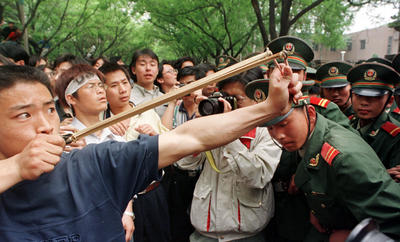The US claimed it targeted a Serbian arms depot, but aimed and hit the Chinese embassy due to outdated maps.
The embassy bombing sparked a number of violent protests and nationalist outpouring within China directed against the US (and to a lesser extent, NATO). Key themes in the Chinese writings about the bombings included the century of national humiliation (1839 – 1949) and victor narratives (1949 – present) to interpret it; the uncritical acceptance that the bombing was deliberate and a logical progression in the historical humiliations directed against China by the West; and the privileging of unity and sovereignty as key to overturning national humiliation and restoring national strength.
In writing its own history China has cast itself into the victor narrative overwriting the century of national humiliation. But the victim/victor dynamic — the interplay between the victim and victor discourses — has continued to shape Chinese nationalism, especially during the aftermath of the embassy bombing.
Analysing how modern Chinese history has been written and the way in which Chinese people think about their history provides insight into Chinese nationalism today. Since 1991, China’s mass Patriotic Education Campaigns have promulgated the story of modern Chinese history as one of victimisation-to-victory. The century of national humiliation and victor narratives are framed in Chinese historical textbooks as a series of key chronological events.
Starting from the First Opium War 1839-1842, the century of national humiliation includes the burning of the Old Summer Palace in 1860, the Treaty of Shimonoseki in 1895, the Boxer Rebellion in 1905, the 21 Demands from the Japanese in 1921 and the War of Resistance from 1933 to 1945.
From 1949, with the final wresting of control of Beijing from the Nationalists and China ‘standing up’ to foreign powers, the victor narrative succeeds the century of national humiliation. It highlights defeat of the US (imperialists) during the Korean War (1950- 1953) and the success of modernisation during the reform and opening era. The victor narrative overlooks discontinuities in China’s victory, of which the Great Leap Forward and Cultural Revolution stand out as prominent examples. More recent accounts have extended China’s success to include the return of Hong Kong to China in 1997, the hosting of the Olympic Games in 2008 and the successful emergence of China as a superpower.
The century of national humiliation knits together all negative events of pre- revolutionary history that can be blamed on outsiders — military occupations, massacres, unequal treaties, economic extractions, violations of sovereignty and loss of territory — which all led to the humiliation of China. The Chinese nation-state is seen as the subject of history and maintaining China’s unity and sovereignty are highlighted as key to overturning national humiliation. China’s victor narrative overwrites the century of national humiliation and knits together all the positive events since 1949. The victor narrative echoes the lessons of the century of national humiliation, privileging unity and sovereignty as vital to China’s success.
In the aftermath of the embassy bombing, nationalist writers claimed that the bombing was a logical extension of past humiliations directed against China by the West. They highlighted the importance of defending China’s sovereignty and unity as a means of overcoming this humiliation. China’s humiliation was thus seen to be recurring in the present, and China’s victory narrative was overlooked. Yet at the same time nationalists also subscribed to the logic that the victory narrative overwrote the century of national humiliation, highlighting the importance of unity and sovereignty as intrinsic to China’s successful modernisation and emergence as a superpower.
There is therefore a coexistence between two strands of history, which shape Chinese nationalism: The teleological category of old-style Marxist history, in which there is an inevitable progression toward a preordained and scientifically discoverable future; and China’s deep historical consciousness wherein historical narratives are drawn upon as templates in which contemporary experience is processed and which assumes that situations recur in history.
Unity and sovereignty are attached to both the century of national humiliation and victor narratives. The century of national humiliation insinuates into the victor narrative and the narratives exist as two sides of the same coin. By sharing the same themes, they become mutually reinforcing and further enculturated within Chinese society. Unless the importance of unity and sovereignty are de-emphasised within Chinese propaganda as vital to China’s strength, it is likely that the century of national humiliation and victor narratives will continue to shape how nationalists interpret future ‘crisis’ events in which a foreign power is involved.
Patrick Chin-Dahler holds first class honours in Asian Studies and is currently studying a Masters of Public Policy (Economic Policy) at the Australian National University.


The US explanation or excuse that it was due to the mistake of using old map was never credible nor convincing, at least to virtually all Chinese on the mainland.
Most Chinese believed (and still do probably) that the US purposefully and deliberately targeted the Chinese embassy to teach China a lesson and to show China the difference in military power between the two countries. Many believed that the US and NATO might have used this action to retaliate against China for its opposition to their military action against Yugoslavia and to teach other countries that dared to oppose them a lesson too.
Of course China was powerless then to respond in military terms due to the lack of projection power and to their much inferior military fighting power and technologies.
That was an international military power display to humiliate China by the US and NATO possibly.
Was there any international justice in that?
Pity that author doesn’t discuss the West’s uncritical acceptance that the bombing was accidental.
The only exception being the BBC journalist John Simpson in his autobiography mentioned a American ambassador confessing it was not accidental